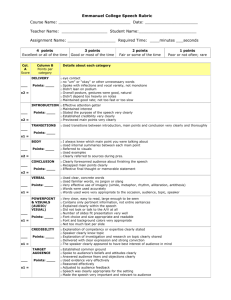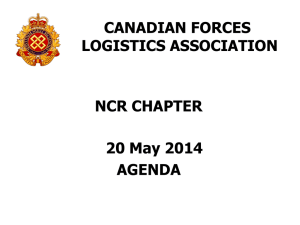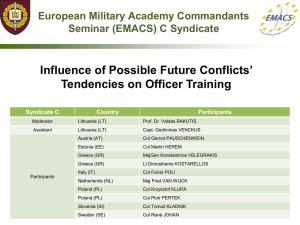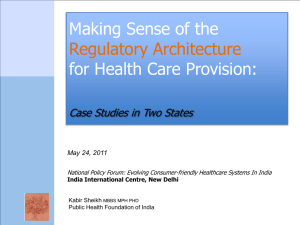Minutes of COL Coordinators Meeting 10:30 am Finish Time 08:30
advertisement
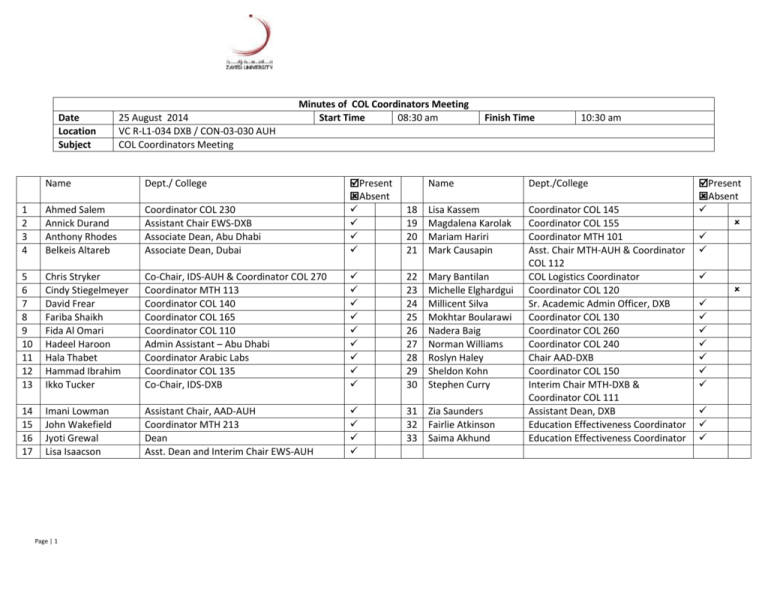
Date Location Subject 25 August 2014 VC R-L1-034 DXB / CON-03-030 AUH COL Coordinators Meeting Minutes of COL Coordinators Meeting Start Time 08:30 am Coordinator COL 230 Assistant Chair EWS-DXB Associate Dean, Abu Dhabi Associate Dean, Dubai Present Absent Chris Stryker Cindy Stiegelmeyer David Frear Fariba Shaikh Fida Al Omari Hadeel Haroon Hala Thabet Hammad Ibrahim Ikko Tucker Co-Chair, IDS-AUH & Coordinator COL 270 Coordinator MTH 113 Coordinator COL 140 Coordinator COL 165 Coordinator COL 110 Admin Assistant – Abu Dhabi Coordinator Arabic Labs Coordinator COL 135 Co-Chair, IDS-DXB Imani Lowman John Wakefield Jyoti Grewal Lisa Isaacson Assistant Chair, AAD-AUH Coordinator MTH 213 Dean Asst. Dean and Interim Chair EWS-AUH Name Dept./ College 1 2 3 4 Ahmed Salem Annick Durand Anthony Rhodes Belkeis Altareb 5 6 7 8 9 10 11 12 13 14 15 16 17 Page | 1 Finish Time 10:30 am Name Dept./College 18 19 20 21 Lisa Kassem Magdalena Karolak Mariam Hariri Mark Causapin 22 23 24 25 26 27 28 29 30 Mary Bantilan Michelle Elghardgui Millicent Silva Mokhtar Boularawi Nadera Baig Norman Williams Roslyn Haley Sheldon Kohn Stephen Curry 31 32 33 Zia Saunders Fairlie Atkinson Saima Akhund Coordinator COL 145 Coordinator COL 155 Coordinator MTH 101 Asst. Chair MTH-AUH & Coordinator COL 112 COL Logistics Coordinator Coordinator COL 120 Sr. Academic Admin Officer, DXB Coordinator COL 130 Coordinator COL 260 Coordinator COL 240 Chair AAD-DXB Coordinator COL 150 Interim Chair MTH-DXB & Coordinator COL 111 Assistant Dean, DXB Education Effectiveness Coordinator Education Effectiveness Coordinator Present Absent Item Recommendation / Decision Responsibility Unit/person Date Dean’s Remarks Dean extended a welcome to all and introduced Saima Akhund and Fairlie Atkinson as the Educational Effectiveness Coordinators. Job Description for Educational Effectiveness Coordinators will be sent to all. 1 Education Effectiveness Coordinators’ Roles Contact Fairlie or Saima for assistance on Course Files/Learning Outcomes and Assessment/ Quality Framework Emirates (QFE). For Arabic and Islamic courses – Coordinators have any questions are free to ask Associate Dean or Assistant Dean on both campuses. 2 Submission of Assessment Schedule Submit Common Assessment Schedule for courses, if any conflicts will suggest alternatives. Complete syllabi and submit to Hadeel in AUH and Millicent in DXB – NLT 8/28 All COL Coordinators 28/8//2014 3 Academic APRTF Recommendation and General Education Meeting 17/9/2014 Meeting 9/9/2014 4 Page | 2 Presentation of your Course: 5-7 minutes Roslyn and Imani need to discuss with Dean APRTF academic recommendation. COL sequence as proposed by UC was approved by CAO. COL 255 will be offered this semester. Dean recommended raising issues so solutions can be found. Ahmed to meet with Dean to discuss APRTF academic recommendations Sheldon – Revision of COL 155 Curriculum Review COL 105 Career Exploration This course guides students through the process of exploring careers and provides the strategies and skills necessary for a lifetime of career-related decision-making. Students explore options for future careers by engaging in four activities: investigating the world of work, considering the career-planning process, recognizing the relation between various academic majors and career choices, and becoming familiar with CV writing. Academic skill development and advising are ongoing throughout the course. COL 120 - Life Skills: Topic UC sequence, GradesFirst, BlackBoard What is Personal Development Planning? Definition of success, what does success mean to you? Goal-setting Identifying personal strengths and areas of improvement, reflecting on personal learning history, responding to setbacks Learning SHAPE (Style, Habits, Attitudes, Preferences, Experience), Developing a Personal Performance Profile through self-assessment SWOT analysis of goals, campus resources, time management, attitude, emotional intelligence, stress management, managing personal performance Problem solving & task management, Introduction to Community Service Project Project topic selection & research question development, identifying keywords for project research Librarian Visit (searching for sources of information, evaluating sources) Self-evaluation of people skills, connecting with others, listening, teamwork, giving & receiving criticism, dealing with difficult people, leadership Understanding how to be creative, using strategies to generate ideas Information literacy - APA references & in-text citations Community Service Project - Group Presentations Approaches and models of reflection, developing a personal model of reflection What should be included in a personal records file? Understanding what employers want, choosing a job Job Applications (cover letters, CVs, interviews) Job Applications Continued Recognizing personal change, reviewing reflections, planning next steps Preparation for Self-Registration COL 130 – Arabic Concepts Arabic Concepts (COL 130) is an Arabic language course that aims to advance the students proficiency in writing, reading and speaking skills, through critical engagement with selected multidisciplinary texts. The texts are organized in five units as shown in the class schedule below. Each text is followed by interactive questions and drills. At the end of each unit, the student will also have the chance to review some basic linguistic information: orthographic, Page | 3 semantic, syntactic, and stylistic. COL 130 will help students streamline their academic writing skills in order to express a range of ideas and methods of argumentation clearly and concisely in Modern Standard Arabic. They will learn how to analyze and sort out information, find evidence and evaluate its quality, organize ideas for writing, use the appropriate word choice, create meaningful sentences, and connect all in convincing and coherent arguments. Students can also at this stage learn fluency and clarity in expression through oral presentations of course texts, to communicate ideas to the rest of the class in a correct and accurate. COL 135 - Islamic Civilization I This course attempts to deal with the disciplines conventionally known as "Islamic studies" or "an introduction to Islam." After discussing the emergence of these disciplines, various disciplines are analyzed, covering essential topics such as definition, limits, basic issues, major branches and schools, and relation to other disciplines. The focus is on approaching Islam as a living religion and reality, rather than a dogmatic approach or as a mere source of glorification of the historical past. COL 230 – Islamic Civilization II This course is to focus basically on the general frameworks of the Islamic Civilization, in order to introduce a comprehensive preview of the various aspects and tracks taken, or innovated, by this Civilization in its historic evolution. Therefore, the course is by nature an introductory one dealing with a variety of highly varied issues, presenting a strong challenge to whoever may teach it. The instructor should first of all focus on the overall frameworks, general trends and basic issues, and in the meantime, must present the various intellectual and doctrinal trends in each. For the course combines both the general absolute and the specific relative. Therefore, this course is supposed to be comprehensive and balanced, and, should simultaneously present the various aspects of the Islamic Civilization. It should also be balanced by equally expressing all different views and doctrines. Meanwhile, the major purpose of the course is to build an intellectual methodological framework that may take the students out of the romantic vision received through upbringing, and construct a rational one based on understanding, analysis and criticism. Any category should be considered true only when it has already been examined and scientifically criticized so as to give room to a variety of views, and at the same time to give these views its legitimacy. COL 140 / 140A – English Composition I Page | 4 For COL 140 and COL140A, there has been an overall change in emphasis from a focus on summary and response to a focus on summary with a response related to a specific prompt that elicits certain rhetorical modes - extended definition, cause and/or effect, and comparison and / contrast. The essay will require the learners to respond to a prompt that requires usage of at least two of the three rhetorical modes. The number of course learning outcomes has been reduced from 13 to 7 and assessments from 10 to 6. While there are no instructor points, the teachers are free to arrange the allocation of points for the first assessment via multiple drafting of a summary and response with an extended definition and the same is the case for the essay. There will be a mid-term exam and a test also. The final exam will comprise the analysis of a text and the writing of an essay based on a prompt to elicit the rhetorical modes taught during the semester. CoOL140A will be made more challenging for the learners by having them read and be assessed on texts that longer in length and are more complex. The assessments will also be larger in length. COL 145 – English Composition II English Composition II further exposes students to academic reading and writing practice with a focus on persuasive writing in various rhetorical contexts. It provides instruction and practice in university-level reading skills, and requires students to implement, in written and visual form, persuasive strategies in academic and non-academic contexts, and participate in group discussions and projects. Students learn to identify and use persuasive language, summarize, paraphrase, read and write critically, and design persuasive academic and nonacademic pieces of composition for specific audiences. The course requires students to choose a commodity that is causing ecological problems or is traded or produced unethically and design an awareness campaign ad for consumers. Students are then required to write a 1000 to 1200 word persuasive essay with the same objective. Grammar instruction is a component of this course, which emphasizes clear, correct writing based on the process of composing, revising, and editing. In addition to the course material, students are encouraged to become self-directed learners, capable of reading university level content. The course prepares students for COL 240 English Composition III. COL 240 – English Composition III This final course in the English Composition cycle has a dual focus. It aims to improve students’ secondary research competencies, particularly in the areas of finding, understanding and evaluating general and academic resources. It also aims to improve students’ academic composition skills, focusing in particular on a) their abilities to Page | 5 incorporate information sources effectively and in a principled manner b) their abilities to plan, draft and edit more extended argumentative text c) their ability to deploy rhetorical modes (e.g. Defining, describing, narrating, comparing etc.) as part of a longer composition with increasing independence. COL 150 Global Awareness I Human Geography is the first course in the Global Awareness sequence. As the team revised the course over the summer, after meeting with Jyoti to clarify expectations, the team of volunteers ensured that each week has a guiding question and specific learning goals that are mapped to ZULOs. Further, since this has been identified as a “Beginning” level course, the learning outcomes are all designed with appropriate levels of Blooms taxonomy. To align the course closer with the methods and content of COL 140, the assessment strategy has shifted from multiple choice to constructed response questions that require writing. All instructors also have been provided with a revised template for recording their weekly learning plans. Initial feedback from faculty seems quite positive, and this iteration of the course seems much more straightforward for the faculty and hopefully will result in greater student learning. COL 155 – Global Awareness II Imperial Encounters, provides comparative examination of imperial states. Each examined in four different sections. Imperialism and its transition. COL 110 – Mathematical Modeling with Data I am the coordinator for the course COL 110-Mathematical Modeling with Data. From this course, the students can organize, analyze data and present it by using Excel spreadsheet software. The students will be able to know the differences between the quantitative and qualitative data and they will learn some math skills and they will be able to solve any real world problem using technology. COL 111 – Mathematical Modeling with Functions This course is designed to provide students with a broad general education in quantitative reasoning and critical thinking. It will also provide a foundation for the development of their ability to function competently and confidently in majors’ programs. The course will focus on analytical reasoning and thinking to solve real world problems in business, finance, economics, computer science, education and the natural sciences. Page | 6 The content of the course will be delivered through classroom activities and projects to introduce the students to the various topics. For some topics or case studies, data can be from primary sources connected with other courses, such as Environmental Science, Health Science and COL 110. In each area, knowledge, analytical skills, critical thinking and understanding will be developed using relevant examples for discussion, analysis and interpretation in class with follow up exercises or assignments of a similar nature to be done individually or in groups outside the classroom. COL 112 – Mathematical Modeling in Business This course is designed to provide students with a broad general education in quantitative reasoning and critical thinking. It will also provide a foundation for the development of their ability to function competently and confidently in Business Science majors. The course will focus on analytical reasoning and thinking to solve real world problems in business, finance and economics. The content of the course will be delivered through classroom activities and projects to introduce the students to the various topics. MTH 101 – Basic Mathematics MTH 101 Basic Mathematics is a developmental course designed for students with low mathematics placement scores. The course is considered to be a revision of areas of basic mathematics involving operations with variables, linear equations, problem solving, percents, graphing linear equations, and interpreting graphs. Students build upon these foundational mathematics skills to explore the applications of basic algebra in real life word problems. MTH 213 – Business Statistics Follows from MTH 112. Introduces students how statistics is used in business. Students try to predict from samples in business. COL 165 - Nature of Science Discovery The primary goal of this course is to cultivate habits of mind by engaging students to critically explore the world, evaluate ideas, and apply their learning to solve real-world problems. The course emphasizes process more than specific content, while fostering evidence-based reasoning. The learning experience will integrate many disciplines, including biology, chemistry, physics, environmental science, psychology, and health sciences. The focus, however, will remain on Page | 7 helping students reflect, analyze, think critically, and understand the nature and process of human inquiry and decision-making. Emphasis is placed on observing, seeking patterns, looking for relevance, explaining data, asking good questions, verifying ideas, and applying knowledge from multiple perspectives to find solutions to complex problems. During the course, students will also explore how science functions within the context of different societies and environments, giving them insights into the historical and cultural pathways that have shaped scientific ideas. By using an interdisciplinary approach to understanding the nature of scientific discovery, this course will serve as an important step towards gaining scientific literacy. COL 260-Environmental Science COL 260 is an introductory course in environmental science. It provides students the background necessary to understand the complex environmental problems facing the UAE and the World. Opportunities are provided in the course, where students discuss burning environmental issues such as high ecological footprint, global warming, ozone layer depletion, food shortages and greenhouse effect. The students understand how their daily life choices contribute to these problems and take accountability. They discuss how these concerns can be addressed and what could be their probable solutions. The course examines the biology, chemistry and physics of environmental problems as well as the economic and social issues that influence the solutions to these problems. At the end of the course the students carry out a research on the topic of their interest and they make a poster or PowerPoint presentation to their peers. COL 270 – Introduction to Information Technology We live in a world that depends on information technology. Computers, cell phones, worldwide data networks and other digital marvels are used in every profession and in all academic disciplines. This course prepares each Zayed University student to be fully capable and informed 21st-century citizens by emphasizing essential IT knowledge, skills and perspectives. Students in COL 270 engage in activities that focus on developing and refining their ability to understand and apply IT concepts, products and services in their academic, personal and professional lives. Through information-technology-enhanced approaches to collaboration, communication, security, creativity and learning, students will master the critical thinking and technology-using skills needed to excel wherever life takes them. COL 270 is designed for students of all backgrounds and academic interests. Page | 8 Prior experience with computers, software and the Internet is required. COL 270 is not a course designed to teach you basic computing or software skills. COL 270 will improve your ability to use IT devices more productively, but you are expected to know how to use your computer, operating system, word processor, spreadsheet, email, web browser, cell phone, tablet computer, etc. when you enter the course. 5 Page | 9 Course files / CLOs / QFEs Fairlie: Will simplify the process Alignment with the QFE Map our course learning outcomes to ZULOs to QFE It is a CAA requirement 1/3 of all academic programs will be aligned by 2014 COL does not have much to do, as all courses have CLOs Review CLOs, 4-6 Learning Outcomes for a course Map CLO to ZULOs, identify 2-3 ZULOs to a course Map to QFE will be done by Fairlie and overseen by Tony CAO wants feedback from students, how well the CLO were met during the semester Process: Course Learning Outcomes today in Syllabi and sent to Fairlie and Saima, copy Tony Template will be ready by Wednesday, 27 August at 5 pm 1. Fairlie will map them to ZULO 2. UC already mapped assessment to ZULOs 3. Syllabi: Learning Outcomes, ZULOs. Tony: Assessment table already mapped to Learning Outcomes per course Students and faculty will be asked if CLO were met Syllabus template for every course Need a simplified version of syllabus for students. CAA required, give them that syllabus, select portions useful and highlight. Students to concentrate on highlighted portions Time line distributed by Fairlie for actions Not using Metacourse for course copying anymore. Metacourse will contain Course Files, and therefore sensitive information Template (Jimson Lee) will be rolled out to students and faculty Wednesday at 5:pm This semester the time frame to populate templates was short. However, Spring Semester all templates should be populated in time. Documents and timeline attached. Fairlie 27 Aug 14 5:00 pm 6 AOB Contacts in Dean’s Office: Tony – SMT Belkeis – GA Lisa Isaacson – Language sequence Zia – COL 105 and COL 120 Secretary Name Signature Page | 10 Millicent Silva Chair Jyoti Grewal
